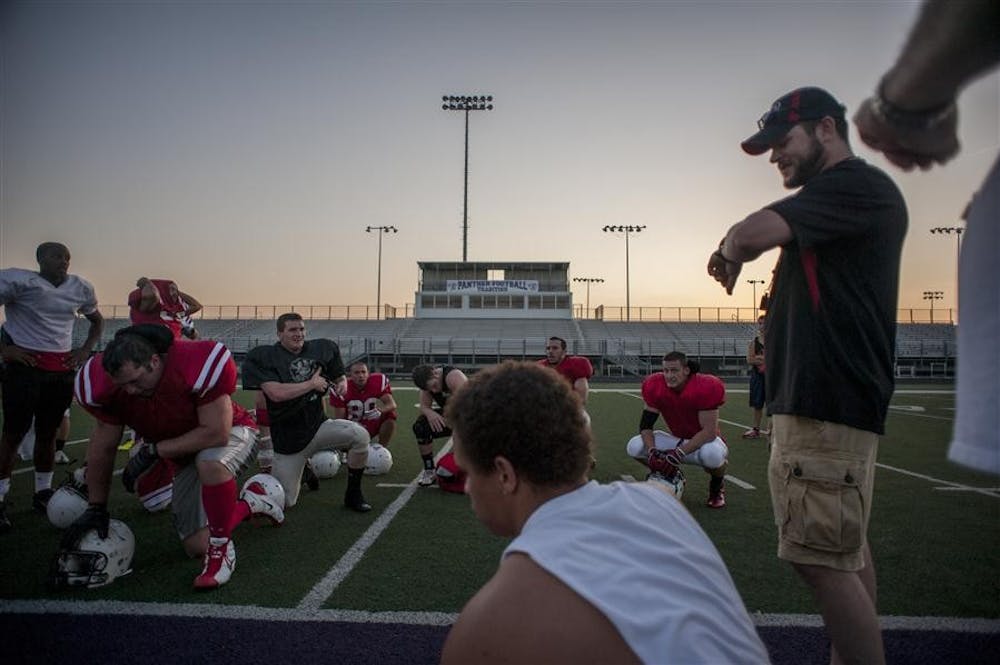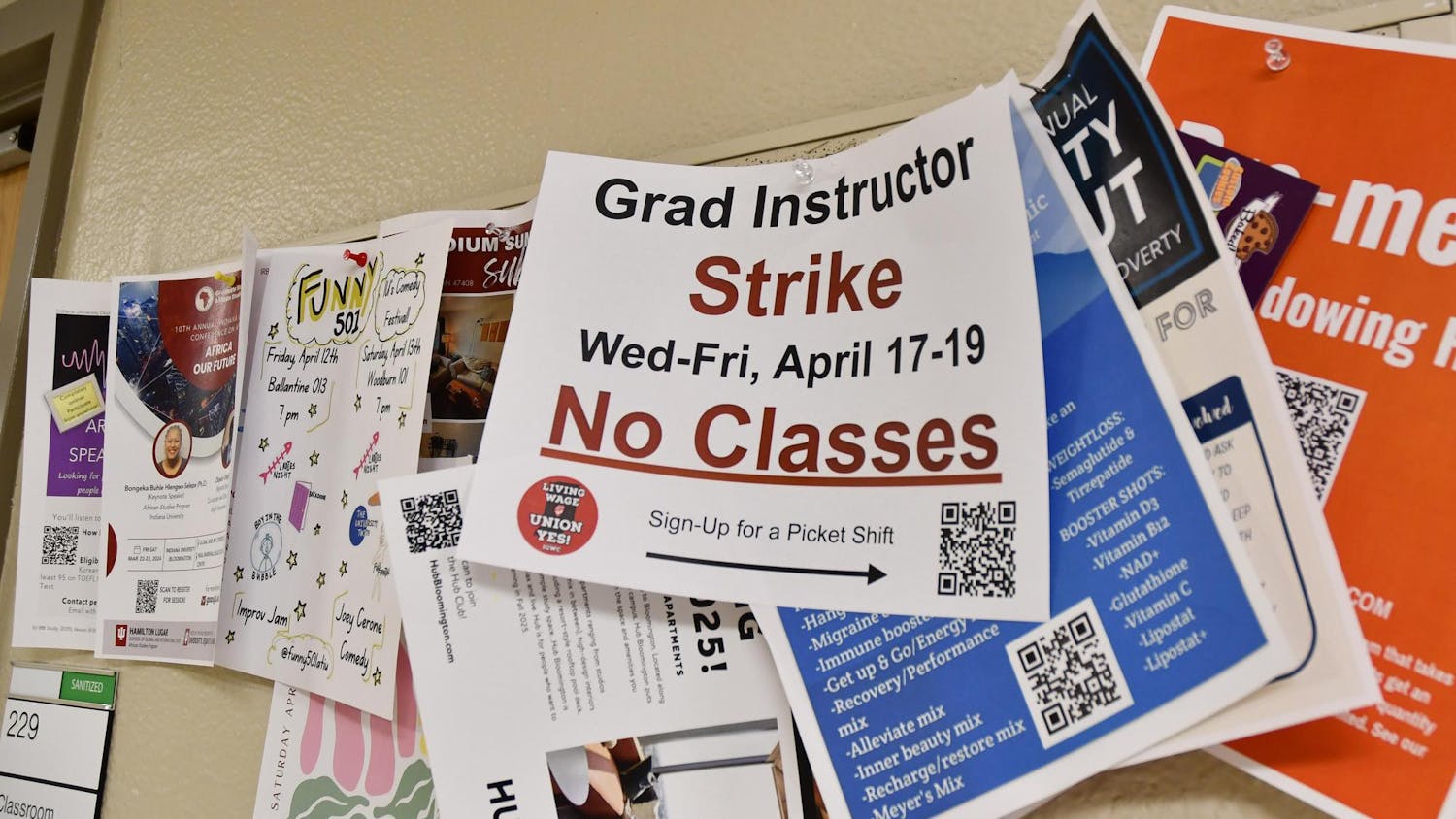The field beneath his feet helps define who he is.
Green football turf means he’s the head coach of the Bloomington-based Indiana Cutters, a semiprofessional football team.
But before he was head coach, the desert sand beneath his feet meant he was an infantry soldier. During his nine years, five months and five days in the Army, there were three desert deployments — one to Kosovo and two to Iraq.
He’s been out of the Army for nearly five years, but reminders of his definition as an infantry soldier are everywhere.
The Army is how he met his wife, and he deployed with her in the same unit to Baghdad. The Army is why it’s not a smart idea for him to play football after several improvised explosive devices exploded too close, causing a brain injury in addition to a slew of other physical injuries.
And the Army is why his eyes are extra sensitive to the sun after so much time in the desert.
So, instead of putting on a helmet and running onto the field, he wears sunglasses and a baseball hat whenever he’s outside. At practice, the 31-year-old hangs a whistle around his neck and carries a practice plan in his left pocket.
His name is Jay McCool.
It’s his actual last name, and he carries himself the way someone with the last name McCool would — slightly intimidating, yet open and friendly. He coaches with a stern attitude and a dry sense of humor.
But that, along with earning an IU degree, is how he plans to move from an Army career to a permanent football coaching career.
***
“Alright, men. Today we hit.”
McCool stands with his team in a huddle at the center of Bloomington South’s football field. It’s a Tuesday evening in May and for the Cutters, this is the first practice in full pads, the first practice where they can actually tackle and make full contact.
And it’s exactly one month and one day before the first game on June 16 against a new Interstate Football League team: the Kentucky Xtreme.
McCool wastes no time. He tells the team to pair off and watch as two of the captains, Nick Land and Bob Magiera, demonstrate how to tackle.
“Any questions on how this is going to work, men?” McCool says. “Let’s go. On the 40. On the whistle.”
He puts the whistle to his mouth and blows. The sound of football pads crashing together follows.
Semipro football players have a variety of experience from high school to NFL teams. Most players are in their 20s and 30s, but some are in their 50s. They balance football with jobs, families and other obligations.
Official team practice began in April, but the captains have been running weekly conditioning and drill sessions since February.
Early on, who came to condition with the captains changed from week to week. But since official practice started, a core group of 20 to 30 players have attended each week, in addition to the occasional stragglers or new players.
If players pay the fee, they’re on the team. It’s not like a high school or college team where the guys both want to be there and are required to be there, McCool says.
But he knows who’s put in the work. Every practice, he marks attendance in his red binder. The men at the most practices are his starters.
When practice ends a little after 8 p.m., the sun that was once beating down on the players is now setting.
The team meets for a final huddle. McCool tells them they need more heart, more intensity. He knows they have it.
“This is becoming our core group. ... Men, you gotta get that intensity up,” he says. “You think the Kentucky Xtreme are gonna take it easy on us?”
***
It’s a Sunday afternoon, and McCool is killing bees. He has already killed five in the kitchen window.
Because of the bees, all the apartment windows are closed, making it a bit warm. But the weather can be so back-and-forth in April, it’s not worth turning on the air conditioning.
McCool stands at the second-story window, looking outside to his left where the bees are swarming by the wall and the edge of his patio deck.
Cursing the bees from behind his clenched teeth, McCool says he called maintenance, but the man said there was nothing he could do, except maybe come spray.
So, McCool goes to check it out for himself, leaving his wife, Desiree, along with their English golden retriever, Loki, and two ferrets, Salt and Pepper, inside the two-bedroom apartment.
Both veterans, the couple attends college with help from the G.I. Bill. Desiree graduated in December 2011 with a degree in art history, and McCool plans to graduate this December with a degree in recreational sports management.
As part of his degree, he has a summer internship at Iron Pit Gym Fitness Center, which is also a team sponsor for the Cutters.
McCool comes back inside.
“The bees, they’re right here, honey, on this wall,” he says to his wife and points to the wall of their apartment with the doors to the deck, a bookshelf and the kitchen window.
“I know they pollinate the world, but they can do it somewhere else,” McCool says.
It was the week before 9/11 when McCool became an Army sergeant. Besides three deployments, he’s been stationed at Fort Drum, N.Y., and Hohenfels and Heidelberg, Germany.
When he was deployed to Fallujah in 2003, he was anonymously quoted spewing cuss words as rocket-propelled grenades hit on page 202 of a book called “Among Warriors in Iraq.”
When he was in Heidelberg, so was Desiree Vanderkleij. They started dating, and two weeks later, they were engaged.
After they deployed to Baghdad from December 2005 to December 2006, they took leave from Heidelberg in 2007, flew to McCool’s hometown of Houston and got married in a courthouse.
On the wall of the second bedroom — McCool’s “man cave” — are team photos from the Cutters and from when he played semipro in Germany and helped coach an American High School team, the Heidelberg Lions.
Around the room are medieval swords, video games and military honors. The closet is filled with the couple’s Army gear.
Here is where McCool plays Battlefield 3 on his Playstation 3 and lets his ferrets run around. A night owl, McCool doesn’t go to bed until about 4 a.m. and wakes up around 9 or 10 a.m.
He’ll stay up playing video games or working on ideas he has for the Cutters, adding to the playbook he digitized last season.
But on Sunday evenings, McCool and Desiree watch “Game of Thrones.” Loki, named for the Nordic god of mischief, likes to stay close by and will sometimes lie with them on the couch.
“We’d been through so many life-changing things before we were married,” Desiree says. “If we can make it through mortar attacks and just the stress of being there, we can make it.”
***
Semipro football is a summer sport. There are 10 Saturdays of games beginning in June, all played in the heat.
But on the first day of practice in late April, it’s cold. The sky is overcast, and the wind whips the chill.
The Cutters are at Brown Elementary, where they played during their first season in 2007, and the field isn’t much. The grass is uneven and no chalk paint marks the yards or sidelines.
McCool has his arms folded against his chest and is watching as the offensive players move from formation to formation. The title of head coach means nothing to McCool unless his team wins championships.
“Twins right,” he calls out, wanting the two receivers to line up on the left and the tight end on the right side of the formation. Like reading a textbook, it’s the twins first and then the tight end is right.
“Right twins, right twins,” one of the players says in a singsong voice as the men find their spots.
“Twins right,” McCool corrects. “Twins right,” he repeats slowly.
“It’s twins right because if I drew this on a piece of paper, the twins would be on the right,” he explains. “This isn’t Arabic. We read left to right.”
McCool doesn’t like to repeat himself. It’s a waste of time. He credits his military experience for that philosophy.
“You don’t have time to sit and debate. You have to go on first command, first action,” McCool said. “Essentially, that’s football. Give a command and go.”
But the similarities between football and war only go so far. Some, like McCool’s predecessor John Shean, now the team president, say football is a way to release a desire to combat.
McCool knows some terms are the same. Yet to him, “blitz,” “battle in the trenches” and “bomb” just happen to translate to both football and war.
***
After a review of formations and basic game strategy, the first practice picks up speed. After a quick jog and stretches, the players then break into three groups to do stations McCool and the captains have picked to work on footwork and the short distance sprinting.
McCool keeps time on his cell phone, five minutes for each set, and moves from station to station, watching. As he crosses the middle of the field, a player calls out to him.
“Blow the whistle, we need it.”
“My phone says you don’t,” McCool says, holding out his phone.
“Your phone’s lying.”
“You’re saying my stopwatch is lying? If you knew how much time has gone by, you’d feel weak. It’s been three minutes and you’re crying.” McCool says and keeps walking.
Later, when players pretend to be shocked that they have water breaks, McCool tells them it’s not the Army, although he knows a guy who he can put up in a tower to shoot rounds at their heels to make them work faster.
One player says it might help. McCool laughs.
The first day is the hardest, but it can be fun, too.
After several rounds through stations and water breaks, McCool calls the players in. The first half of the day is finished. Only two more hours and the rest of the season to go. He tells the players to take a 15-minute break.
McCool raises his arm into the middle, and the players do the same.
“Cutters on three,” he says. “One, two, three.”
“Cutters.”
McCool’s voice is above theirs.
“Do it again,” he says. “I shouldn’t be louder than all of you.”
The cheer booms from the circle.
“Cutters.”
INDIANA CUTTERS vs. KENTUCKY XTREME
When 7 p.m. Saturday
Where Bloomington South Football field
More info Season opener for the Cutters, tickets are $5
From battlefield to football field: Veteran becomes head coach, leads Cutters Football team

Get stories like this in your inbox
Subscribe





